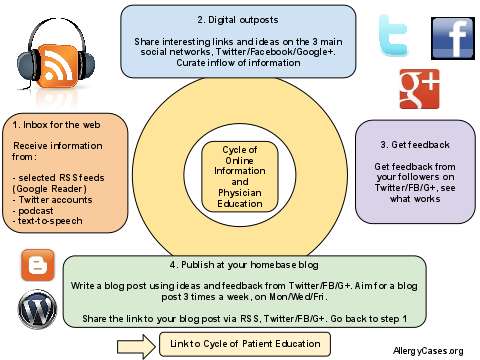
Online Reputation Management in Healthcare
The objectives of each healthcare professional who chooses to establish a presence in the healthcare social media space is going to vary. As such we will have colleagues who are interested in “Inbound” marketing objectives, “Outbound” marketing objectives, personal learning, educational outreach, reputation management, or simply for advertising their services. In Part I of this series, we explored “Why you should seek to establish your digital media footprint”. Part II focused on the offline preparation necessary to prepare for a healthcare social media presence. Meredith Gould was kind enough to elaborate on the sociological perspective of your offline planning in Part IIb.
I recently surveyed 180 physicians and healthcare professionals and 25 wrote in that they were interested in reputation management. Many people are discussing their diseases and their physicians online … it behooves the practicing physician to actively monitor their presence online and manage their online reputation long before a brewing firestorm has the potential to effect the bottom line of their practice.
What are your Digital Media Needs?
Healthcare, Social Media, Information Velocity … and Your Online Reputation
The sheer velocity at which healthcare information travels online today means that establishing a digital presence is rapidly becoming a necessity for healthcare professionals, medical practices, and institutions.
There are numerous reasons or value propositions for those who endeavor to establish an online healthcare digital presence – – – and each individual will determine their own reason why they feel they want their practice or institution to venture online.
At its heart, digital media is about people, it is about relationships, and it is about communications. A social media presence is about educating, engaging, and growing your audience, improving outcomes, compliance, and potentially improving the bottom line of your practice.
The Pew Internet Research Group, in 2011, showed that nearly 80% of Internet users, or 60% of all adults, have searched online for health information – – – or information about their healthcare providers. This brings to light one of the clearest or most valuable reasons why even the most hesitant physician or medical practice should consider developing a deep online digital presence – – – that reason is online reputation management (ORM). What used to be hidden and buried is now surfacing on social networks. This can be your enemy or your friend. Take advantage and publish and promote your digital brand online.

Take advantage and publish and promote your digital brand online.
As a physician you spent years building your professional reputation. This was built through a combination of outcomes, willingness to collaborate, word-of-mouth based on people’s experience, perception, research, teaching, community involvement, and extracurricular activities. There is very little difference between how your reputation is built and managed today as how it was in years gone by – – – except that today the velocity at which information spreads has dramatically changed. A patient in your waiting room, when you are running an hour behind, who possesses a smart phone, can quickly post a scathing review about your practice – – – and if you do not monitor your mentions, possess an online digital strategy, that review will rate very high on Google, Bing or other search engine page results.
Do you know what your patients are saying about you? You should!
Do you know what your recourse is? Read on …
~ The very first steps to be taken in establishing a proper online reputation management strategy is off-line preparation. This involves setting up a Google alert utilizing search terms that identify your practice, your partners, as well as any other keywords you feel are important. You may be surprised at how often you will receive an alert that your name is now appearing in Google.
While identifying these instances is of significant importance, it is of more significant importance to understand how you can be effective at combating any negative reviews which may exist on page 1 of a Google search in your name.
~ Create a homebase or foundation online. Companies such as Symplur° have seasoned consultants who are proven experts in the healthcare and social media space and have assisted many healthcare professionals initiate, grow and maintain their online presence.
~ Start a website, a blog, a facebook page, or you can even use a physician profile page on a site like HealthTap, or Avvo.com. Creating content is not nearly as onerous as it initially seems. “The 41st patient initiative” has helped many overcome that deep “ugh” you feel when asked for the content necessary to build out your website. Links drive Google’s SEO juice… so share your links on Twitter or Facebook, and engage your followers.
~ Having a presence on other well-known social media platforms will also go a long way towards driving down unwanted search results. If you set up a professional profile on LinkedIn and Google + they will rank higher than a single poor review on the sites referenced previously.
~ The advice mentioned here is for the average physician who had a bad day and wasn’t able to please 100% of the people 100% of the time. If you find that a poor review is showing up online on a weekly basis you had better sit down with your group and perform a deep dive introspective review. If your staff or a member of your group is routinely generating poor reviews, then you will need to deal with that internally prior to pursuing the aforementioned online initiatives.
Considering a Digital Presence? Questions,Concerns— Let’s Talk!
Do you have questions regarding an Orthopedic injury or longevity?
Do you want to talk to an expert who can listen to you for 45-60 minutes and explain the options in detail?
Dr. Howard Luks offers remote guidance sessions to review your X-ray or MRI images and explain your options.
Dr. Luks has also received hundreds of requests for educational sessions on the topics discussed in his book, Longevity Simplified.
~ As hard as it may seem… Dr. Ves Dimov’s advice is relevant. Embrace constructive online criticism. Consider it a 360-degree evaluation.
What Are Your Digital Media Needs?
º I am a consultant and Principal of Symplur














Simon Sikorski MD
Howard, I would advise against posting on physician directories and public-facing review sites unless a doctor is planning on spending a significant amount of time sharing your knowledge on those sites. Most of the time it’s an “impulse-buy” where a doctor signs up and then never comes back again. Here’s what happens then…
The biggest issue with physician directories like AVVO is that they feature other doctors’s answers. Disagreements arise and not always are doctors viewed in the best picture. In addition, other doctors can be found with a click of a button. It’s a major disservice for physicians who are spending money on promoting their practices.
So while the doctors signs up, he builds yet ANOTHER website that promotes his name and competes with his own practice’s website (or worse… if he doesnt have a website)
Basically, anything on Google is part of reputation management for doctors. Docs should be very careful to what they subscribe to and when they do decide to subscribe they should seriously think about the implications.